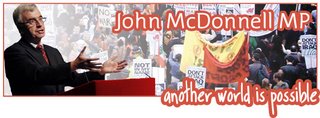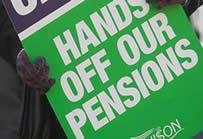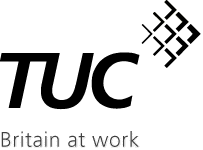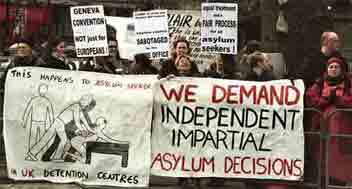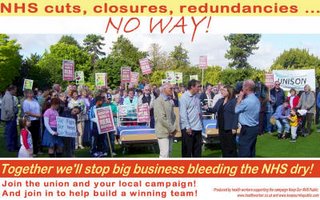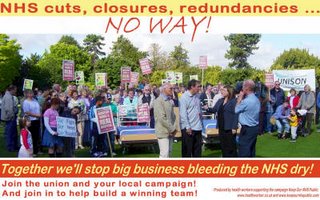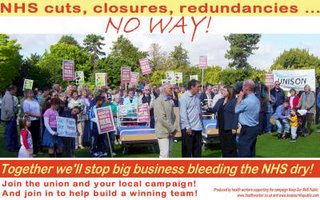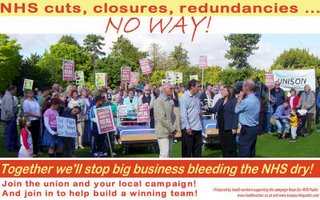Report of the UNISON NEC meeting June 7 2006This is a personal report of the NEC meeting which took place on Wednesday 7 June 2006, which I circulated to those branches for whom I had an Email address in the hope that it might have been useful in the run up to National Delegate Conference.
These are the sort of reports which I will post here from now on. Although I won't go on at such great length in future (I promise).
The meeting commenced with some controversy arising from sensible proposals from the Executive Office to try to reduce the expenditure on NEC meetings (which has been overspent) by using cheaper hotels – if any branches would like further details about this please let me know. The meeting then moved on to the agenda.
National Delegate Conference Business
The meeting noted that, as Glenn Kelly, representing local government on the NEC, was attending Conference as a branch delegate he would be asked to leave those parts of any NEC meeting dealing with Conference business.
The NEC agreed policy on some motions to Conference which had not previously been dealt with. It was agreed to oppose a motion calling for the closure of current nuclear power stations as this was in line with our current policy to oppose new nuclear stations but not existing ones. I asked for evidence of this current policy, but did not oppose the proposal. The place to change such a policy would be at National Delegate Conference – branches may want to discuss nuclear power when mandating delegates to Conference.
Various composite motions have been agreed by the Standing Orders Committee and these were put to the National Delegate Conference to agree policy. The NEC is supporting all the composites except Composite E on the Education White Paper, which is being opposed on the grounds that it calls for a national demonstration. I unsuccessfully proposed that the NEC should support Composite E.
The NEC also agreed policy on amendments to motions at National Delegate Conference.The NEC is supporting all amendments except 2.2, 3.3, 3.4, 17.2, 35.6, 35.9, 65.1, 78.1, 79.1, 81.1, 82.1, 101.2, 107.1, 108.1,126.2, 145.1 and 146.1. If branches would like to know about any particular amendments, please get in touch.
Motion 17 calls for a National Conference on Health and Safety. It has attracted two amendments, one from the NEC (17.1) proposing Regional seminars as an alternative and one from the South East Region (17.2) proposing a national seminar as an alternative.
Following discussion at the Regional Health and Safety Committee I queried the NEC policy of opposition to amendment 17.2 from the South East Region. Roger Bannister who sits on the National Health and Safety Committee from the NEC explained that the National Health and Safety Committee had drafted amendment 17.1 and urged the NEC to support that against amendment 17.2, which was agreed. Our Region is, of course, already organising a Regional seminar in the autumn. Branches may wish to look at amendment 17.2 as a way of building upon the good work already being done at Regional level.
The NEC also agreed a provisional list of NEC speakers for Conference and two Emergency Motions, one on opposition to the British National Party and one on Government attacks upon the Access to Work scheme. Branches who may wish to be involved in Emergency composites on either topic (should the motions be admitted to the agenda by the Standing Orders Committee) have until Monday to get motions submitted on the appropriate form, having agreed them at a quorate meeting (please get in touch if you need any more information about how to submit Emergency motions to Conference).
Recruitment
The NEC received an update on very strong recruitment this year, associated with the dispute over the Local Government Pension Scheme (LGPS). Greater London Region was specifically mentioned for overcoming the highest turnover in the country to record growth in the first few months of this year. It was reported that an organising campaign is to be launched at National Delegate Conference.
Pensions update
The NEC received a brief – one and a half sides of A4 – report which provoked a long debate about the LGPS dispute. It was reported that the trade unions had “noted” the proposals on which the Government have gone out to consultation and did not support or endorse them. It was reported that the other trade unions were not in favour of resuming industrial action at this time. They preferred to await the outcome of the judicial review for which UNISON has applied, and which is proceeding. It is hoped that there will be an early hearing of the judicial review and that this will force the Government to withdraw their current proposals.
Louise Couling asked a question to confirm that the other unions had made clear their opposition to resuming industrial action. It was confirmed that this was the case.
I asked a series of questions about our campaigning activity, in particular why this seemed to have tailed off and why we had not lobbied in support of an Early Day Motion (EDM 1973) calling for the Regulations to be revoked. I expressed disappointment that we had allowed ourselves to lose momentum in the dispute since the suspension of the action.
It was subsequently agreed that the campaign did now need to be “stepped up” – the Head of Local Government advised the meeting that UNISON had supported the Early Day Motion in question, but the Chair of Labour Link, Steve Warwick, reported that UNISON MPs had not felt that an Early Day Motion was the right tactic at the time.
Glenn Kelly said that he hoped that the Local Government Service Group Executive would support a resumption of industrial action, and that there ought to be no need to re-ballot in this case. Graeme Horn (West Midlands) asked specifically if a re-ballot was necessary. The Deputy General Secretary confirmed that there would be no legal requirement to re-ballot but that there might be practical reasons why this would be recommended.
Moz Greenshields (East Midlands) felt that further industrial action was “inevitable” as the dispute was not resolved and asked about our lobbying of the European Commission. In response the Head of Local Government reported that UNISON had been speaking with the European Commission but that there was no prospect of their taking any action until there was a final set of proposals, and after the judicial review which UNISON has instigated.
Stephen Mead (Higher Education) urged the NEC to put its faith in the judicial review and commented that the proposals on which the Government are currently consulting were the best that could have been obtained before 1 October. He reported that the Higher Education Service Group Executive was not confident of support for further industrial action at this time.
Roger Bannister (North West) commented that we had taken the pressure off by suspending the action and that as a result the Government and employers were taking advantage. He warned against relying on legal action.
John McDermott (Yorkshire and Humberside) described the Government’s proposals as totally unacceptable and urged a special conference and a membership ballot on any proposals on protection for existing scheme members. In response the Head of Local Government said that it was current policy of the Local Government Service Group to hold a ballot only on any final proposals for the new-look LGPS itself.
As well as explaining the Labour Link view on the Early Day Motion, Steve Warwick (South West) said he hoped for a “sensible” decision from the Local Government Service Group Executive (by which he clearly meant not the resumption of industrial action).
Diana Leach (South East) asked about the position in Scotland. It was explained that the Scottish employers had wanted to make a better offer but the Scottish Executive had been warned off by the Treasury.
Irene Stacey asked about the position of low paid workers excluded from the pension scheme, and also how many branches had contributed funds towards the dispute.
It was explained that very few donations had been received and that the majority of all donations had come in one large donation from the Greater London Region.
Chris Tansley (East Midlands) stressed his view that the employers were clear that the current proposals for limited protection were only “interim” pending the judicial review and that negotiations should continue. He favoured a re-ballot to maintain unity.
Raph Parkinson (Additional Members seat) reported on strong support for industrial action in Liverpool and urged the NEC to be confident of our members’ willingness to take action. He felt a re-ballot need not be viewed negatively as it could demonstrate our members’ willingness to take further action.
Jane Carolan (Scotland) explained the position in Scotland and stressed that our focus was not on the “Rule of 85” per se but on developing a fair and equitable pension scheme.
Mike Hayes (Wales – and Chair of the Finance Committee) reported on donations to the fund set up for the dispute.
The Head of Local Government concluded the debate, making various points which I have reported above alongside the comments to which they were a response. She also acknowledged that funding problems of some NHS employers had been raised as an issue in discussions about the future of the NHS pension scheme.
Positively Public CampaignThe NEC received a detailed report on future proposals for the Positively Public Campaign, which had been approved by the Policy Committee. This was a discussion document, and it provoked considerable discussion. If branches would like sight of an electronic version of this document please let me know – but please bear in mind it is a discussion document!
One of our Policy Officers introduced the report, which emphasised how UNISON would aim to organise seminars and to invite Government Ministers in order to achieve influence with the Government.
Glenn Kelly commenced debate on the report with some sharp criticism of aspects of the report, in particular a proposal that UNISON would arrange “dinners” for Government Ministers. At this point the General Secretary intervened to make clear that that particular proposal had already been rejected.
I made some criticisms of the way in which the report failed to create an opportunity for members to participate in our campaign for public services – as would be created by (for example) supporting the lobby of Parliament on 27 June.
I also expressed my concern that the report might be seen as diluting our opposition to privatisation, not least because it referred to moving away from reporting “bad news” in our bulletins.
Moz Greenshields (East Midlands) asked a series of questions about the report and expressed concern at positive references to the use of the “Toyota Total Quality Management” approach in local government. John McDermott (Yorkshire and Humberside) expressed further criticisms of the report.
Chris Tansley (East Midlands) welcomed the report as providing a strategic approach and defended UNISON’s link with the Labour Party. Graeme Horne (West Midlands) supported this view and stated that the Positively Public campaign had established UNISON as “credible” which would be important in maximising our influence with a change of Prime Minister.
Louise Couling reported that seven representatives of the Greater London Regional Labour Link Committee had recently participated in an event alongside Government Ministers and had felt optimistic and listened to as a result.
Linda Coey (Northern Ireland) reminded the NEC about the current Public Administration Review in Northern Ireland and its relevance to this debate.
Steve Warwick (South West) – speaking as Chair of Labour Link – welcomed the report and advised the NEC that the Labour Link was working on a strategy for the Third Term (of a Labour Government) and to maximise influence with a new Prime Minister, which would be reported to the Labour Link forum at the end of June.
Jane Carolan (Scotland) – speaking as Chair of Policy – expressed her surprise that any NEC member should think UNISON was diluting its opposition to privatisation and expressed her strong support for the report, which had been agreed by the Policy Committee and supported strongly at a meeting of Regional Secretaries and Convenors.
In responding to the debate, the Policy Officer emphasised that the report was a discussion document and should not be seen as diluting our opposition to privatisation.
Equal PayThe NEC received a copy of a very brief confidential report which had been considered by the Services to Members Committee of the NEC on 26 May. The essence of this was that the NEC is consulting within the union on the definition of “mass litigation” for the purposes of determining those legal cases to which a 5% fee should be applied if they are successful (strictly speaking these cases are taken by Thompsons and not by UNISON, as our Rules do not cover charging such fees).
Glenn Kelly asked about why we still did not have a definition of mass litigation and it was explained that this was the subject of consultation. I asked about the progress of the litigation being taken against the Union.
The NEC was also advised that litigation against UNISON has been stayed pending a case against the GMB, the outcome of which is expected to be known by the end of next week (i.e. before Conference).
These are cases, backed by No Win No Fee solicitors and taken against trade unions on behalf of union members who claim that agreements reached in relation to grading compromised their rights to Equal Pay. It is hoped that the NEC will be in a position to make some sort of statement at Conference.
John McDermott (Yorkshire and Humberside) stressed how absurd it was that UNISON was not discussing Equal Pay at our Conference.
Keep the NHS Working CampaignThe NEC received an update report on the “Keep the NHS Working Campaign” about which you can get further details on the UNISON website. The Union has already supported a lobby of Parliament alongside other unions on 11 May and various campaign activities are in the planning stage, including local, regional and national demonstrations. The focus of the campaign will be on the financial crises in those NHS trusts with deficits, and on defending the NHS against privatisation.
Sandra Dean (West Midlands) reported that in the West Midlands campaigning activity was well underway and that the Region wanted to see more central direction.
Glenn Kelly expressed doubt about the campaign if, as had seemed from earlier debates, UNISON was going to put its faith in Gordon Brown as Prime Minister.
I welcomed the report as very positive and asked for an assurance that we would be working with the Keep Our NHS Public campaign and that we would involve members from all service groups in the defence of the NHS.
Norma Stephenson (Northern) pointed out that not all NHS trusts had deficits.
Annette Mansell-Green (West Midlands and Chair of the General Political Fund (GPF) Committee) responded to Glenn Kelly’s points by pointing out that campaigning work would be undertaken by the GPF as well as Labour Link.
John McDermott (Yorkshire and Humberside) suggested that UNISON estimate and publicise the share of the total NHS budget which was going to pay profits to companies involved in PFI projects.
June Nelson (Additional Members seat) stressed the scale of the financial problems confronting our members in London in particular. This point was echoed by Sue Highton (Yorkshire and Humberside) who stressed the urgency of a campaigning response to the financial problems of the NHS.
Mike Folliard (Health) pointed out that there was not necessarily an overall shortage of NHS funding – the problem was that funds were not allocated where they were needed.
Steve Warwick (South West) speaking again as Chair of Labour Link, responded to Glenn Kelly refuting the suggestion that he – or anyone else – had put any faith in Gordon Brown.
Dave Prentis intervened to point out that the Union had traditionally focused on two key campaigns, chosen each year after Conference, and that this could be one of those two campaigns for the coming year.
In responding to the debate, the Policy Officer pointed out that this was a preliminary report and acknowledged many of the points which had been made.
Financial ReportsThe NEC received the annual financial reports which are going to Conference. Following discussion at the Regional Health and Safety Committee I asked for a detailed breakdown of the part of the budget which covers health and safety and was promise a written response (which I will pass on to the Regional Health and Safety Committee). The NEC also received reports on the Union’s expenditure in the first quarter of this year and from the auditors.
If any branches are interested in the Union’s finances please get in touch for more information.
Other mattersThe NEC also received a report on the provision of IT equipment to NEC members (the provision of which explains why this report is so much longer and more detailed than previous reports…)
The Chair of the Staffing Committee (Bob Oram – North West) reported that an agreement had nearly been reached with the staff trade unions on a pay and grading review linked to a three year pay deal.
UNISON Insurance now has a website at which UNISON members can get quotes over the internet –
http://www.uia.co.uk/.
Various matters were raised arising from the minutes of various Committees. The most significant of these debates concerned discussion at the Policy Committee on the Public Services Not Private Profit campaign. John McDermott (Yorkshire and Humberside) queried the Committee’s decision, as reported in its minutes, not to support this campaign. I asked whether this meant that the Committee had also decided not to support the lobby of Parliament on 27 June. Moz Greenshields (East Midlands) also intervened to ask why UNISON would not support this joint union lobby. Glenn Kelly asked for a vote on supporting the lobby.
At this point the General Secretary intervened to explain why he felt that, whilst we should “wish other unions well” with the lobby we should not ourselves support it. He felt that we should concentrate on working through the TUC, perhaps towards a lobby in the autumn.
Glenn Kelly then asked that his proposal be put to a vote. The Chair of the Policy Committee (Jane Carolan) expressed the opinion that the decision not to support the lobby had already been taken. The President (Christine Wilde) stated that this was correct and refused to take a further vote, closing the meeting.
From my notes of the meeting, it was incorrect to suggest that this decision had in fact been taken. I do not think that the NEC took any decision in relation to the lobby of Parliament on 27 June, called by the Public Services Not Private Profit campaign, and will raise this in connection with the minutes of this meeting at the next meeting of the NEC.





